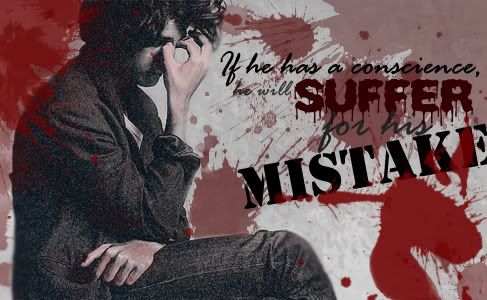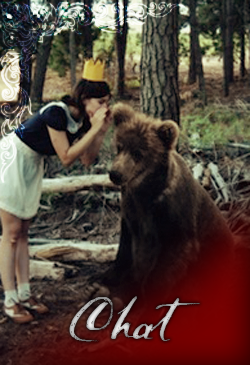Post by DMITRI SEMILETOV on Mar 21, 2012 23:19:52 GMT -5
...dmitri davidovich semiletov *
* “He doesn’t love anyone, and maybe he never will . . .” *
[/size]* “He doesn’t love anyone, and maybe he never will . . .” *


...basics*
name Dmitri Davidovich Semiletov (DMEE-tree Da-VEED-o-vitch Seh-mee-LEH-tawv)
nickname Mitya, Mitka, Mitenka, and Dima by his family and friends in Russia.
age 23
gender Male.
grade N/A
hometown Pushkin, Saint Petersburg, Russian Federation
sexuality If you asked him, he’d give you a weird look and walk in the other direction. But if it helps, he was engaged to a woman once.
personification Rodion Romanovich Raskolnikov, from Crime and Punishment by Fyodor Dostoevsky
status DORMANT
face claim Louis Garrel
...appearance*
hair color Dark brown and curly, usually kept a little on the long side. Thick and soft in texture.
eye color Dark brown, almost black. Contemplative.
build Tall and thin. Not in a particularly healthy way.
height Six feet even.
clothing style He doesn’t have very much money, so most of his clothes are from Goodwill, Salvation Army, or thrift stores – or else they are very, very old. He likes scarves and coats. Also hats. Hats are nice.
distinctive traits Strikingly handsome. He also has a small beauty mark on his right cheekbone.
...personal*
personality
In simplest terms, Dmitri hates people.
He hates their voices. He hates their faces. He hates their personalities. He hates what they do, what they say, and what they stand for. He hates their stupidity and their vacuous, meaningless lives. They are all malicious to him, faceless and worthless, and he hates them.
Dima is a stubborn misanthrope. No amount of convincing will persuade him to think that human beings are worth his time – he isolates himself from a society in which he already feels alienated. His social skills could be described as slightly lacking at best and downright incompetent at worst, so he tries to keep from talking to other human beings as much as possible. Human depravity sickens him. He loathes crowds – he loathes any large congregation of people. Even just being in a large group makes him feel antsy, like anyone could be watching him, staring at him. For some reason, he has always been mistrustful of other people’s intentions, and for that reason is loath to place his confidence in any one particular person. Because of this, even those who have managed to get close to him do not know the inner workings of his mind. He is exceedingly private, keeping his feelings and thoughts very close to his chest. He has built a bit of a wall around himself to keep people out, and, most of the time, it works.
Dmitri’s general lack of faith in people often translates into frigid unkindness. Though he is capable of manners and actually has a surprisingly gentlemanly bearing that radiates a sort of subdued chivalry, his words are usually biting and sarcastic. He has a horrid tendency to mock people or simply ignore them if he doesn’t get a good enough first impression from them. Even around people he likes, he is often shy and reluctant to speak, which occasionally makes him seem rude when he doesn’t intend to be to the more easily offended. He is often even callous towards those who care for him.
Dmitri is an obvious pessimist, to the point of fatalism. He believes that the world is destined for nothing but destruction, that the human race will eat itself. He always assumes the worst, and for that reason is almost never disappointed. This cynicism extends to himself, as well – Dmitri thinks himself just as worthless as most other people, helpless to change his situation or change anything in the sordid world in which he lives. He automatically assumes that most of his endeavors will fail, and encourages people not to love him or even like him, as he believes that relationships will never end well. His lack of faith in himself translates into self-loathing and self-deprecation, not often spoken aloud but largely mental. Often, this self-hatred shows itself in self-destructive tendencies – for instance, he smokes a lot, and sometimes spends money recklessly when he has it.
At the same time, Dima has a bit of a Napoleon complex. Though he hates himself, he hates everyone else considerably more, and for this reason feels that his status is slightly elevated above many of those around him – he feels that he is more important than he is sometimes. This doesn’t show in his speech, but often just in his bearing. He is often exceedingly condescending or patronizing, be it in his small mocking smiles or his irritated eyerolls. He can make almost anyone thoroughly upset or frustrated with him in this way, and this aura regularly keeps people from approaching him out of sheer repulsion. Of course, Dmitri doesn’t mind this at all.
In fact, some of Dmitri’s behavior could be classified as sociopathic. He feels very little sympathy towards other human beings most of the time, and it takes a very special person to stir him. He occasionally believes himself above the law, as if he should not have to be bound by society’s rules. He believes this in part because he is exceedingly intelligent, considerably more than the average. Dmitri is an excellent writer, a fair artist, and a passionate speaker when he wants to be. He is well-spoken and eloquent. His ideas are innovative and original, but his concepts of religion and morality are not only extremely different from most people, but tend to waver. One day, he may seem passionately religious, and the next, a staunch atheist.
Still, his lack of feeling is not constant – almost nothing about him is. Sometimes, he does something particularly heroic or kind, and it shows that he is, in fact, a good man, deep beneath his cold exterior. Occasionally, he performs an extreme act of altruism, usually without being asked and always without accepting a reward. This confuses most people who know him, as he seems like the last person who would ever do such a thing – but, surprisingly enough, he is capable of it. He is capable of feeling, but his feelings are fickle. His moods often swing from one to another within a matter of minutes, particularly when he is having a bad day.
Dmitri is also deeply thoughtful. He is very preoccupied with philosophy, with the ins and outs of religion, morality, ethics, and the meaning of life. He has spent days submerged in thought, wandering around in the world as if it is a separate entity from himself. When he is deep in the recesses of his brain, he sees and hears almost nothing. He doesn’t respond to people even when they speak to him directly. Dmitri lives largely inside of himself and not in the world around him. His mind is both his fortress and his prison – because he thinks too much, he becomes obsessed with the tiniest things, goes over the smallest of details. He is a perfectionist and more than a little paranoid, due simply to his mistrust of people. He worries far too much and it puts a great deal of stress on him.
This preoccupation with tiny things makes Dmitri’s life a constant cycle of anger, sadness, and disappointment. He is truly a miserable person, tortured by all the mistakes he has made and by the darkest parts of his boundless mind. For years, there has not been a moment that he can remember being consistently happy. He crushes himself, and the world around him crushes him even more simply by his complete disenchantment with it. Dmitri honestly believes that everything is horrible, and what isn’t horrible is fleeting. He is a wretched young man.
past
In a town outside of St. Petersburg, in the month of October, The Semiletovs, David Romanovich and Agrafina Alekseyevna, were blessed with their firstborn, a beautiful baby boy. He had his father’s dark eyes and strong nose and his mother’s dark, luscious hair, already in a mop on the day he was born. They named him Dmitri.
The first few years of life were tough – the Soviet Union was collapsing, and Russia, the former central hub of power in the USSR, was to be left without some of its former might. However, this did not faze young Mitya. He was an innocent child, with a love of play and a mind for games. He learned to read without being taught, was clever with numbers, and, though quiet, was expressive and well-mannered. His parents were terribly proud of him.
Mitya’s mother and father, though not particularly wealthy, liked to baby their son. David Romanovich was a fairly successful writer, but the bad thing about writing – of course – was that income was more spontaneous than consistent oftentimes. Still, the family was happy. David Romanovich was very fond of his son and taught him many little skills, such as basic carpentry. He read to him every night and played with him every day, as being a writer allotted a great deal of home time for him. Dmitri’s mother was a wonderful cook, as was his grandmother. He was raised in a standard Russian Orthodox family, and though they were often rather poor, they were happy.
When Mitya was 5 years old, the Semiletovs were graced with their second child, a beautiful baby girl that they named Tatyana. Tanya, as she was called by her family, was a boisterous little girl, a bit on the unruly side and incredibly energetic. She talked far earlier than Mitya, but she did not read quite as quickly as he did. Mitya was initially jealous that his baby sister got so much attention, but grew quickly to love her. He became quite protective of her, but in a sort of distant way. Though he rarely defended himself from schoolyard insults, he often defended Tanya’s honor when it was called into question.
As conditions in Russia began to improve, Mitya’s family enjoyed a new level of wealth that they had not previously had – they no longer had to buy bread with ration stamps. David Romanovich, after years of simple menial work to bolster his family’s income, could finally rely a little bit more on his writing. Both his parents still had to work, however, often leaving Mitya with his little sister for a few minutes when there was an overlap between shifts. The Semiletov family was busy, but comfortable...until just after Mitya’s 8th birthday.
David Romanovich was diagnosed with cancer. Inoperable pancreatic cancer.
He died a few months later.
Dmitri still remembers the day that they buried his father, how he and his mother lingered there for hours after, long after his grandmother had taken Tanya back to the house. They clung to each other and cried over the fresh dirt, yet without tombstone, just an unmarked patch of earth under which lay his kind and loving father. He and his mother cried and cried and cried, for days, for weeks. David Romanovich had been a wonderful man, and the world was somehow not as bright without him.
Tanya, of course, was three. She could hardly understand what had happened to her father.
But Dmitri understood.
Suddenly, the shy but cheerful little boy became a little more withdrawn. He developed a preoccupation with death that lasted well into his teens. He lost faith in doctors and in the world around him, slowly, over time. No-one in the world really compared well to his father, not even his mother, who since David’s death had become fragile, quick to tears. He became impatient with his family and his friends. He began to distance himself.
And once again, the family found itself struggling for money.
When Dmitri was 15, he got a job. He and his mother were both working. Tanya also wanted to work, but at 10 years of age, she could not. Balancing school and work was somehow not difficult for Dmitri, but balancing work and a social life was tricky for his mother – she lost track of many of her friends, drifting away from her old life. Dmitri tried to sustain her, but it was complicated.
As the man of the house, Dmitri found that his mother (who, a somewhat old-fashioned woman, was pathetic without his father) came to rely on him emotionally more and more as the years went on. She developed an exceptional pride in him, always taking time to brag about her “talented Mitya,” how well he did in school or how devoted he was or how handsome he had become, how much like his father he looked. Being the firstborn son of a widow was exhausting, but Dmitri stuck it out.
After Dmitri expressed an interest in law, his mother immediately started saving money for him to go to the university in St. Petersburg. Dmitri was a brilliant student; he took many philosophy and law classes and seemed as if he were on the road to becoming a lawyer. However, he encountered another student in severe need a little ways into his third year at the university, and in an incredible act of altruism gave the young man almost all of his funds. He asked for nothing in return, and the boy was capable of affording medicine for his ailing father or whatever it was he needed the money for. But now, Dmitri was the one in trouble.
He suddenly had no money.
He didn’t want to tell his mother. He was ashamed. He didn’t want to write to his family and tell them that he had given away all of his money, even if he had deemed it a good reason. His mother had placed all of her faith in him, and here he was, squandering it. Instead, he quietly dropped out of the university and fell deeper and deeper into the depressive hole he’d been sinking into since the age of eight.
Desperate to save money, he took up residence at a cheap apartment complex, simply having nowhere else to go. The rent was low, but even so, he didn’t pay it, provoking much heckling from his landlady.
It was while he was staying in the complex that he met a beautiful girl who lived a few doors down from him, a young working girl from Poland named Maria. The two took to talking. She would come by his pathetic little apartment and coerce him into eating, talk to him, keep him company even when he was rude to her. She was not particularly beautiful, but he somehow didn’t mind that – in a sense, he even liked it. Maria was clever and not too repulsive, and he found that, soon enough, they were a couple.
Their relationship was odd, stiff, but present. He didn’t often hold her hand or buy her things, but she didn’t seem to mind. They would spend time just sitting, not talking, just being in each other’s company, and it was...pleasant. He liked her. Maybe, he thought, he could even marry her.
But he did not get the opportunity.
On the day that he had been window-shopping for rings, he came home to the landlady blathering about how the lovely little Maria girl from Poland had been in a horrible accident, how she had died quite suddenly.
No-one ever thought to tell Dmitri to his face.
Maria never came home. Dmitri was once again alone.
One morning, he awoke in his horrid, cramped little apartment and realized he needed to get away.
He needed to get away from Russia. He needed to get away from the oppression of the government and the disappointment brewing all around him. He needed to get away from the people who toddled about happily accepting their fates. He needed to get away from his father’s grave and his mother’s expectations and his sister’s boundless faith in his abilities. He needed to get away from nightmares about Maria. He needed to go.
So he packed up his things, scrounged together the very last of the money his mother could send him, sent his family a letter, and left for the United States.
present
Dmitri didn’t really know why he went to the United States. He had never liked the country. They were arrogant and stupid, all of them. But it was far away, far, far away, and in any case, it sounded good in the letter to his mother – that he was going to America, the richest country in the world. He could make a new life for himself there. Anyone could. Or, that was the story.
He traveled about the country for about a year, sticking largely to the East Coat until he finally managed to settle down in New York City, a bustling metropolis where he could find an affordable, shitty apartment and get himself a job. Not that he particularly wanted a job. Not that he particularly liked cities. It just seemed like a good idea to be somewhere where maybe, if the mood struck him, he might be able to make something of himself.
family
David Romanovich Semiletov, father, writer, deceased
Agrafina Alekseyevna Semiletova, 46, mother, cleaning lady
Tatyana Davidevna Semiletova, 18, younger sister, teaching assistant
likes
Silence
Books
Law
Philosophical discussions
Hats and scarves
Russian food
Potatoes
Solitude
Bridges
Extraordinary things or people
CSI, Law & Order, Criminal Minds – crime dramas
Nighttime
Cigarettes
Russian culture
History
dislikes
Society
People
Assumptions
Fear
Being loved by people
Shitty American fast food (unfortunately, it’s sometimes all he can afford)
Being poor (who likes being poor?)
Sluggishness
Clocks
Feeling helpless
Water
Oversimplification
Crowds or crowded places
Ordinary, plain, unremarkable things
Jesus Freaks (As in the ones constantly trying to convert him to such and such a sect of Protestantism or whatever. No. If he’s going to be religious, he’ll be Russian Orthodox, thank you very much.)
Russian politics
other notes He wears a small Russian Orthodox icon that belonged to Maria around his neck.
...literature*
book title Crime and Punishment by Fyodor Dostoevsky
backstory Essentially, there is a young student named Rodion Romanovich Raskolnikov who lives in St. Petersburg. He is very intelligent and handsome, but very poor and misanthropic. Once a law student, he is forced to drop out of university due to a lack of money. He comes up with the idea that there are two classes of people in the world: ordinary people, who are meant only to reproduce and follow society’s laws; and extraordinary people, like Isaac Newton or Napoleon, who will do great things and make society’s new laws. Raskolnikov proposes that these extraordinary people, for the betterment of humanity, should be able to “step over” some moral choices for the sake of their cause. Preoccupied with the idea of whether or not he is extraordinary himself, Raskolnikov commits a murder: he kills a nasty old woman, a pawnbroker who is mean and greedy, with the blunt end of an axe. However, what he did not expect was that her sister would walk in at the last minute. In a panic, he kills her, too.
He robs the old woman of some of her money and precious items as he intended, but finds that he cannot keep them, so he hides them under a rock. Immediately, he is tortured by paranoia after what he is done; he finds he has been summoned to the police station and goes there, panicking, only to find that it’s just his landlady complaining that he hasn’t paid the rent. He faints, suddenly ill. He then falls into a state of terrible sickness, during which he is attended to by his only friend, Razumikhin, who cares for him deeply.
Basically, what ensues is Raskolnikov slowly going more and more insane, losing track of time, his madness and paranoia intersected with moments of sharp lucidity. He has dramatic mood swings, particularly towards those he cares about. To make things worse, Porfiry Petrovich, an irritatingly cheerful detective, is pursuing him, and his family (his mother and sister) is in town with his sister’s infuriating new fiancé. Eventually, he encounters Sonya, a young woman who has given up her body and become a prostitute to make money for her desperately poor family. He confesses his crime to Sonya, and she urges him to confess. Eventually, he does, but during his trial, most believe that he was suffering from some sort of temporary insanity at the time of the murder, so he is only given eight years of hard labor. During the time that he is in prison, he realizes that he is in love with Sonya – who follows him dutifully to Siberia to take care of him – and they resolve to get married in seven years, once he is released.
...roleplayer*
name Zelda
age really
gender likes
rp experience books
how you found ouac about
rp sample attractiverussianmenwithaxes












